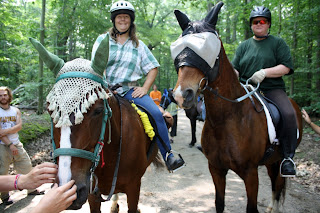 |
| A blind horse and his brother |
“Good. Goo-oo-d. Calm. Good Boy”
A reassuring voice speaks through the darkness, a hand caressing his ear. Reaching to his right, Joplin nibbles on the muscular neck of his faithful brother.
Meet “Joplin”, a blind rescue horse on Wye Island, Maryland. Left to die, Joplin’s story transcends from a bleak road of demise to rediscovering life all over again. Joplin used to see, just like the other horses grazing in the pasture. I wish I could understand the neighs of horse language to tell the gap in the story.
I can, however, feel determination as I run my hands against Joplin’s neck and stroke his soft inquisitive nose. I can sense the love as Joplin’s brother, standing tall and proud, steps closer to let Joplin know he is there, watching out for him. I can also listen to the compassion of the adoptive owners tell a story of a horse and his dedication to overcome struggles and challenges.
They told a story of how adopting Joplin was like having a baby again. Joplin learned spoken words to guide him on his walk and daily activities. He learned to go over logs by raising his hoof to feel and estimate the height. Most importantly, Joplin learned to trust the voice of his new owners.
Joplin’s brother told a different story through the power of touch. Michelangelo once said, “To touch is to give life”. Joplin and his brother may just be horses, but they understand how important a touch can be.
How important is touch?
Give someone a hug today. Touch their hand. Offer a shoulder rub. Hold a baby. A simple touch goes farther than you can imagine.
Reference:
http://greatergood.berkeley.edu/article/item/hands_on_research/
Picture credit:
Allison Popovich, Allison Rose Photography
A reassuring voice speaks through the darkness, a hand caressing his ear. Reaching to his right, Joplin nibbles on the muscular neck of his faithful brother.
Meet “Joplin”, a blind rescue horse on Wye Island, Maryland. Left to die, Joplin’s story transcends from a bleak road of demise to rediscovering life all over again. Joplin used to see, just like the other horses grazing in the pasture. I wish I could understand the neighs of horse language to tell the gap in the story.
I can, however, feel determination as I run my hands against Joplin’s neck and stroke his soft inquisitive nose. I can sense the love as Joplin’s brother, standing tall and proud, steps closer to let Joplin know he is there, watching out for him. I can also listen to the compassion of the adoptive owners tell a story of a horse and his dedication to overcome struggles and challenges.
They told a story of how adopting Joplin was like having a baby again. Joplin learned spoken words to guide him on his walk and daily activities. He learned to go over logs by raising his hoof to feel and estimate the height. Most importantly, Joplin learned to trust the voice of his new owners.
Joplin’s brother told a different story through the power of touch. Michelangelo once said, “To touch is to give life”. Joplin and his brother may just be horses, but they understand how important a touch can be.
How important is touch?
“... thanks to neuroscientist Edmund Rolls that touch activates the brain’s orbitofrontal cortex, which is linked to feelings of reward and compassion.
We also know that touch builds up cooperative relationships—it reinforces reciprocity between our primate relatives, who use grooming to build up cooperative alliances.
There are studies showing that touch signals safety and trust, it soothes. Basic warm touch calms cardiovascular stress. It activates the body’s vagus nerve, which is intimately involved with our compassionate response, and a simple touch can trigger release of oxytocin, aka “the love hormone.” (Keltner, Greater Good)
“In fact, in other research I’ve found that people can not only identify love, gratitude, and compassion from touches but can differentiate between those kinds of touch, something people haven’t done as well in studies of facial and vocal communication.” (Keltner, Greater Good)
Give someone a hug today. Touch their hand. Offer a shoulder rub. Hold a baby. A simple touch goes farther than you can imagine.
Reference:
http://greatergood.berkeley.edu/article/item/hands_on_research/
Picture credit:
Allison Popovich, Allison Rose Photography
No comments:
Post a Comment